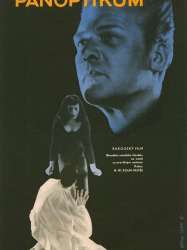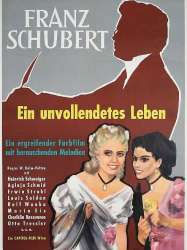Walter Kolm-Veltée est un Réalisateur et Scénariste Autrichien né le 27 décembre 1910 à Vienne (Autriche)

Walter Kolm-Veltée (27 December 1910 – 8 March 1999) was an Austrian film director. He directed nine films between 1933 and 1959. He was the son of Austrian film director Luise Fleck from her first marriage.
He became a respected film director, producer and screenwriter. After his earlier career in which he often worked with his mother and stepfather, he founded in 1952 the first film academy in Austria, at the Hochschule für Musik und darstellende Kunst in Vienna. His film on the life of Beethoven, Eroica, released in 1949, with Ewald Balser, Oskar Werner and Judith Holzmeister in the leads, is counted as one of the most successful Austrian films ever. In the same way that his parents were pioneers of film, so Walter Kolm-Veltée was a pioneer of the development of the new medium of television.
His 1959 film Panoptikum 59 was entered into the 9th Berlin International Film Festival.
Source : Wikidata
Walter Kolm-Veltée

- Infos
- Photos
- Meilleurs films
- Famille
- Personnages
- Récompenses
Nationalité Autriche
Naissance 27 décembre 1910 à Vienne (Autriche)
Mort 8 mars 1999 (à 88 ans) à Vienne (Autriche)
Naissance 27 décembre 1910 à Vienne (Autriche)
Mort 8 mars 1999 (à 88 ans) à Vienne (Autriche)
He became a respected film director, producer and screenwriter. After his earlier career in which he often worked with his mother and stepfather, he founded in 1952 the first film academy in Austria, at the Hochschule für Musik und darstellende Kunst in Vienna. His film on the life of Beethoven, Eroica, released in 1949, with Ewald Balser, Oskar Werner and Judith Holzmeister in the leads, is counted as one of the most successful Austrian films ever. In the same way that his parents were pioneers of film, so Walter Kolm-Veltée was a pioneer of the development of the new medium of television.
His 1959 film Panoptikum 59 was entered into the 9th Berlin International Film Festival.
Le plus souvent avec
Filmographie de Walter Kolm-Veltée (4 films)
Réalisateur

Panoptikum 59 (1959)
, 1h34Réalisé par Walter Kolm-Veltée
Genres Drame
Acteurs Michael Heltau, Alexander Trojan
 , 1h51
, 1h51Réalisé par Walter Kolm-Veltée
Genres Drame, Biographie, Historique, Musical
Thèmes La musique, Lié à la musique classique, Musique
Acteurs Heinrich Schweiger, Aglaja Schmid, Maria Eis, Rolf Wanka, Erwin Strahl, Senta Wengraf
Note60%





Franz Schubert works as an assistant teacher in the school led by his father. In his spare time, however, the young man, who considers Ludwig van Beethoven to be his unattainable role model, devotes himself to writing music. As public acceptance is denied to him, his friends lobby at the music publisher Anton Diabelli for a public performance of Schubert's music. During a reception, at which Schubert performs his Ave Maria, he gets to know singer Therese Grob.

Eroica (1949)
, 1h35Réalisé par Walter Kolm-Veltée
Genres Drame, Biographie, Historique, Musical
Thèmes La musique, Lié à la musique classique, Musique
Acteurs Ewald Balser, Marianne Schönauer, Judith Maria Holzmeister, Oskar Werner, Dagny Servaes, Iván Petrovich
Note68%





An express messenger rides to Vienna and reports at a ball given by Count Lichnowsky that Napoleon Bonaparte is approaching Vienna with his troops. The news spreads like wildfire in the city and also reaches Beethoven, who, together with his friends, is sitting in the tavern. Beethoven is very enthusiastic about the ideals embodied by Napoleon after the French Revolution. He hurries home to write a powerful and glorious symphony - which later becomes famous as Beethoven's "Eroica" - for Napoleon. After the symphony is successful, two messengers from Napoleon come to see Beethoven. They request Beethoven to participate in a reception given by the French emperor. Favouring the glamour, Napoleon has elaborated detailed clothing instructions for Beethoven. Beethoven is disappointed by his idol's superficiality and deletes the dedication to Napoleon from the title page of the symphony.
Scénariste

Panoptikum 59 (1959)
, 1h34Réalisé par Walter Kolm-Veltée
Genres Drame
Acteurs Michael Heltau, Alexander Trojan
Rôle Ecrivain
 , 1h51
, 1h51Réalisé par Walter Kolm-Veltée
Genres Drame, Biographie, Historique, Musical
Thèmes La musique, Lié à la musique classique, Musique
Acteurs Heinrich Schweiger, Aglaja Schmid, Maria Eis, Rolf Wanka, Erwin Strahl, Senta Wengraf
Note60%





Franz Schubert works as an assistant teacher in the school led by his father. In his spare time, however, the young man, who considers Ludwig van Beethoven to be his unattainable role model, devotes himself to writing music. As public acceptance is denied to him, his friends lobby at the music publisher Anton Diabelli for a public performance of Schubert's music. During a reception, at which Schubert performs his Ave Maria, he gets to know singer Therese Grob.

Eroica (1949)
, 1h35Réalisé par Walter Kolm-Veltée
Genres Drame, Biographie, Historique, Musical
Thèmes La musique, Lié à la musique classique, Musique
Acteurs Ewald Balser, Marianne Schönauer, Judith Maria Holzmeister, Oskar Werner, Dagny Servaes, Iván Petrovich
Rôle Ecrivain
Note68%





An express messenger rides to Vienna and reports at a ball given by Count Lichnowsky that Napoleon Bonaparte is approaching Vienna with his troops. The news spreads like wildfire in the city and also reaches Beethoven, who, together with his friends, is sitting in the tavern. Beethoven is very enthusiastic about the ideals embodied by Napoleon after the French Revolution. He hurries home to write a powerful and glorious symphony - which later becomes famous as Beethoven's "Eroica" - for Napoleon. After the symphony is successful, two messengers from Napoleon come to see Beethoven. They request Beethoven to participate in a reception given by the French emperor. Favouring the glamour, Napoleon has elaborated detailed clothing instructions for Beethoven. Beethoven is disappointed by his idol's superficiality and deletes the dedication to Napoleon from the title page of the symphony.
 Connexion
Connexion


